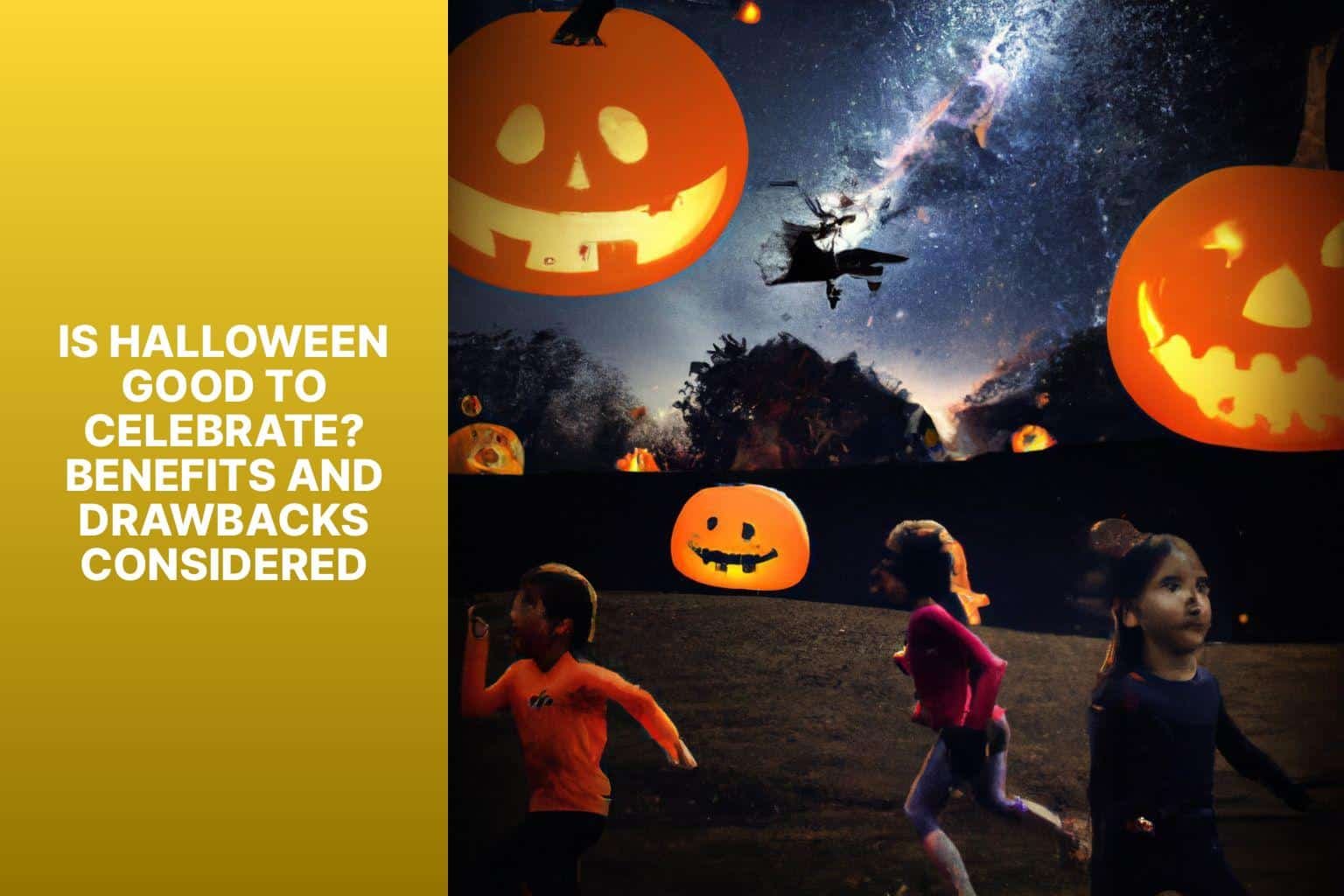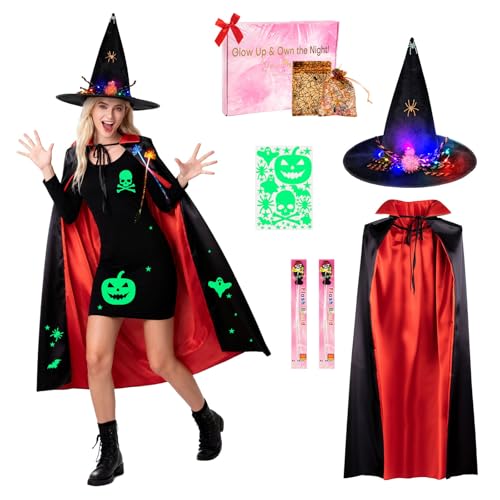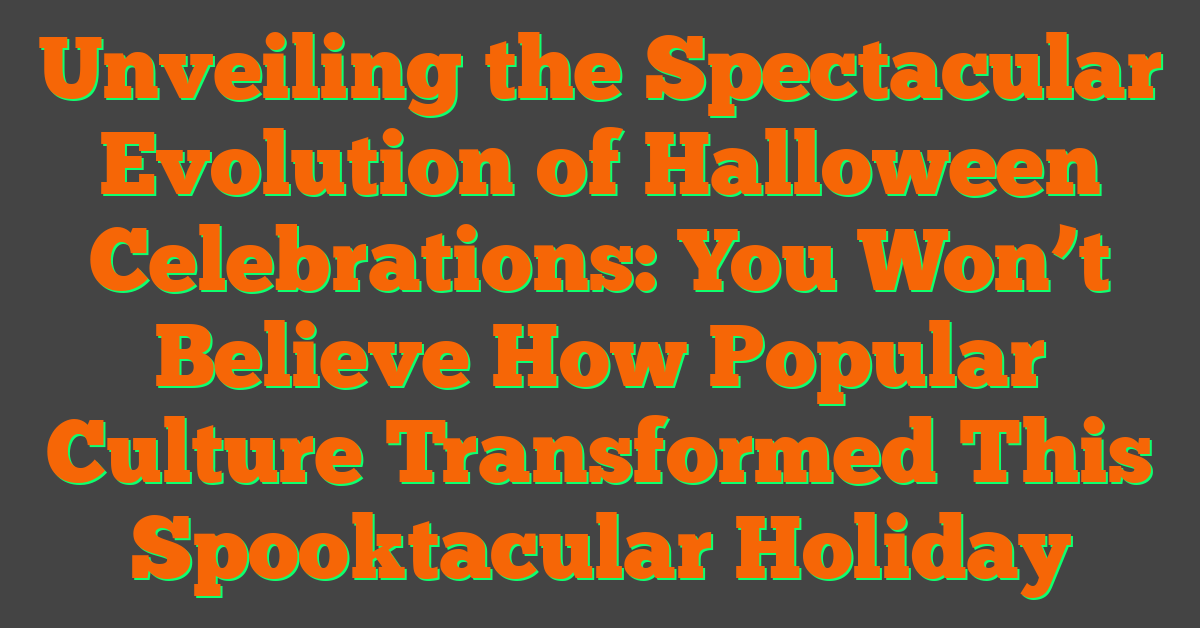Halloween, a holiday celebrated on October 31st, has a rich and fascinating historical background. It originated from ancient Celtic traditions and evolved over time into the festive occasion that is widely celebrated today. Opinions on whether Halloween is good to celebrate vary.
On one hand, there are several pros of celebrating Halloween. It holds cultural and social significance as it allows individuals to connect with their community, embrace their creativity through costumes and decorations, and enjoy a sense of fun and lightheartedness. Halloween also promotes community bonding through neighborhood parties, trick-or-treating, and festive events.
On the other hand, there are cons associated with celebrating Halloween. Religious and cultural concerns may arise as Halloween has connections to pagan rituals and superstitions. The holiday’s emphasis on excessive candy consumption and single-use decorations can have negative impacts on the environment. Safety considerations, such as the potential for accidents, allergies, or inappropriate costumes, also need to be addressed.
Ultimately, whether Halloween is good to celebrate depends on individual perspectives and values. It is essential to weigh the benefits and drawbacks before deciding to participate in the festivities. Alternative ways to celebrate Halloween, such as hosting eco-friendly parties, participating in charitable activities, or focusing on the historical aspects of the holiday, can provide alternatives for those who have reservations.
Key takeaway:
- Celebrating Halloween has cultural and social significance: Halloween provides an opportunity for communities to come together, celebrate traditions, and bond with one another.
- Halloween promotes creative expression and fun: It allows individuals to showcase their creativity through costumes, decorations, and themed activities, providing a playful and enjoyable experience.
- Halloween can foster community bonding: Through trick-or-treating and neighborhood events, Halloween encourages interaction among neighbors, strengthening community ties.
Historical Background of Halloween
Halloween has a fascinating historical background that dates back to the ancient Celtic festival of Samhain. The historical background of Halloween allows us to appreciate its cultural significance and the evolving traditions. During Samhain, people would light bonfires and wear costumes to ward off ghosts, as it was believed that the boundary between the living and the dead was blurred. This rich historical background connects us to ancient rituals and reminds us of the cautionary tales and dark periods in history that have shaped this beloved holiday.
Over time, the festival merged with All Saints’ Day and became known as Halloween. Scottish and Irish immigrants brought their traditions to the United States in the 19th century, which further popularized the holiday. One event that reflects the historical background of Halloween is the Salem Witch Trials of 1692 in Salem, Massachusetts. Several people accused of witchcraft were executed during this period, highlighting the superstitious beliefs and fears of the early colonial era. This event adds to the historical significance of Halloween.
Today, Halloween is associated with costumes, trick-or-treating, carving pumpkins, and spooky decorations.
Pros of Celebrating Halloween

Photo Credits: Rickyshalloween.Com by Albert Brown
Get ready to embrace the holiday spirit as we uncover the exciting positives of celebrating Halloween. From its deep cultural and social significance to the endless possibilities of creative expression and pure fun, Halloween has something for everyone. Not only does it offer a chance to showcase your artistic flair, but it also fosters community bonding like no other occasion. So, join me as we dive into the captivating and enriching aspects of this beloved holiday.
Cultural and Social Significance
Halloween holds both cultural and social significance. It has its roots in the ancient Celtic festival of Samhain, which marked the transition from harvest to winter. During this time, the belief was that spirits wandered the earth.
In the present day, Halloween unites communities and provides an opportunity for people of all ages to partake in festivities. From trick-or-treating to costume parties, it allows individuals to socialize and connect with others.
The customs and traditions associated with Halloween, such as carving pumpkins into jack-o’-lanterns, decorating homes with spooky themes, and wearing costumes, not only provide entertainment but also allow for the expression of creativity.
By celebrating Halloween, communities foster a sense of togetherness and shared experiences. Engaging in activities like dressing up, carving pumpkins, and visiting haunted houses fosters a feeling of belonging and camaraderie.
Halloween plays a vital role in the preservation of folklore and cultural traditions. It serves as a means of passing down stories, legends, and superstitions from one generation to the next, thus ensuring the longevity of cultural heritage and the preservation of important stories and beliefs.
Creative Expression and Fun
Creative expression and fun go hand in hand when celebrating Halloween. This holiday provides an opportunity for people to showcase their artistic skills and imagination through various activities and costumes. Here are some ways in which creative expression and fun are fostered during Halloween:
Costume designing: Halloween is a time for individuals of all ages to let their creativity flow by designing and creating unique costumes. It’s a chance for them to express their personality and interests through their choice of attire.
Pumpkin carving: Carving jack-o’-lanterns out of pumpkins is a cherished Halloween tradition. It allows individuals to experiment with different designs and expressions, giving them a chance to showcase their artistic abilities.
Home decorations: Transforming homes with spooky or festive elements creates a delightful Halloween atmosphere. People can let their creativity soar by engaging in DIY decorations, turning their spaces into haunted houses or enchanting scenes.
Trick-or-treating: For children, dressing up and going door-to-door for candy is a highlight of Halloween. It offers them an opportunity to role-play, interact with others, and have a blast while collecting treats.
Themed parties and events: Halloween parties encourage participants to unleash their creativity. Themed parties can range from eerie to glamorous, providing individuals with a chance to express themselves through their costumes and the overall aesthetics of the event.
Arts and crafts: Engaging in Halloween-themed arts and crafts activities, such as making paper bats or creating ghostly paintings, not only encourages creativity but also brings joy and self-expression.
Through these avenues, Halloween cultivates creative expression and ensures a fun-filled experience, allowing individuals to fully embrace their imagination and enjoy the festivities associated with this holiday.
Community Bonding
Community Bonding is crucial for celebrating Halloween. It unites people and creates a sense of unity and connection in neighborhoods and communities.
1. Neighborhood gatherings: Halloween brings neighbors together for community parties and trick-or-treating. These activities promote interaction, strengthen relationships, and foster a sense of belonging.
2. Collaborative decorations: Neighbors work together to decorate their homes and streets, sharing ideas and resources. This collective effort enhances the Halloween experience and promotes teamwork and cooperation.
3. Community events: Towns and cities organize parades, costume contests, and haunted house tours on Halloween. These events bring people from different backgrounds together, encouraging social interactions and community engagement. They provide opportunities for individuals to meet new people, make friends, and create lasting memories.
In my neighborhood, we have a tradition of organizing a block party for Halloween. Residents of all ages gather, bringing food, drinks, and treats to share. We set up game booths, pumpkin carving stations, and a costume parade for the children. This event strengthens the bond within our community, filling the air with laughter and joy. The unity and connection that Halloween brings to our neighborhood are remarkable, and we look forward to this tradition each year.
Cons of Celebrating Halloween
Considering the cons of celebrating Halloween, we need to delve into the religious and cultural concerns, the impact on the environment, and the safety considerations. Unraveling these aspects will shed light on the potential drawbacks associated with this widely observed holiday. So, let’s dig deeper into the reasons why some might question the celebration of Halloween and explore the implications it holds in various domains.
Religious and Cultural Concerns
Religious and cultural concerns play a significant role in the ongoing debate surrounding the celebration of Halloween. It is important to acknowledge that some individuals and religious groups may have reservations about participating in this holiday due to their beliefs or cultural practices.
From a religious standpoint, certain groups perceive Halloween as contradictory to their faith. This is particularly true for certain Christian denominations, who express concerns about the holiday’s pagan origins and its association with occult practices. These groups firmly believe that engaging in Halloween activities goes against the teachings of their religion.
Culturally, Halloween may create concerns for certain groups as well. Traditional cultural practices and values may not align with the commercialized and often secular nature of Halloween celebrations. People with strong cultural identities may feel inclined to prioritize their own customs and values above participating in Halloween festivities.
It is of utmost importance to recognize and respect these religious and cultural concerns when contemplating the celebration of Halloween. By encouraging understanding and open dialogue, we can foster an environment that promotes inclusivity and allows individuals to make informed decisions about their involvement in this holiday. By taking these concerns into account, we can cultivate an atmosphere of respect and appreciation for the diverse beliefs and cultures that exist within our society.
Impact on Environment
Halloween has a significant impact on the environment. Here are some key ways it affects the environment:
1. Waste generation: Halloween festivities create a lot of waste. Disposable decorations, single-use costumes, and plastic packaging all contribute to non-biodegradable waste that fills up landfills and harms the ecosystem.
2. Energy consumption: Elaborate Halloween displays with excessive lighting and electrical decorations use a lot of energy. This increased energy demand leads to greenhouse gas emissions and worsens climate change.
3. Water usage: Carving pumpkins requires a significant amount of water. Pumpkins are mostly water, and growing them requires a lot of irrigation. People can help mitigate this impact by practicing water conservation and finding alternative pumpkin carving methods.
4. Transportation emissions: Halloween often involves large-scale events and activities, which leads to more traffic and emissions from transportation. Using carpooling or greener alternatives, like walking or biking, can reduce the environmental impact.
5. Chemical pollution: Some Halloween decorations and accessories contain harmful chemicals. The production and disposal of items such as face paints and synthetic materials can release pollutants into the environment, harming ecosystems and human health.
To minimize the environmental impact of Halloween, individuals can choose sustainable alternatives. This includes making homemade decorations, using eco-friendly costumes, and responsibly managing waste. Choosing reusable or biodegradable products can greatly reduce the environmental consequences of Halloween celebrations.
Safety Considerations
Safety Considerations
Halloween safety is crucial. Consider the following:
- Costume Safety: Ensure costumes are flame-resistant and do not obstruct vision or movement.
- Visibility: Use reflective tape or lights on costumes and carry flashlights for better visibility at night.
- Treat Safety: Check treats and candies before eating to ensure they are safe and free from potential dangers or allergens.
- Street Safety: Always use crosswalks and sidewalks. Stay alert and cautious of traffic.
- Supervision: Children should always have a responsible adult with them during Halloween activities.
- Stranger Danger: Teach children not to accept rides or treats from strangers.
Prioritize safety to ensure a fun and enjoyable Halloween for everyone.
Did you know? Halloween is one of the top three deadliest days for pedestrians, according to the National Highway Traffic Safety Administration. Stay safe while trick-or-treating!
Is Halloween Good to Celebrate? Benefits and Drawbacks Considered

Photo Credits: Rickyshalloween.Com by Gabriel Anderson
Halloween: Is it good to celebrate? Benefits and drawbacks considered.
Halloween is a time when people can come together to have fun, dress up, and engage in festive activities. This holiday not only boosts community spirit but also allows individuals to showcase their creativity and imagination through various Halloween traditions. One of the benefits of celebrating Halloween is that children have the opportunity to enhance their social skills by interacting with neighbors and participating in activities that promote community involvement.
The excitement of Halloween is further heightened by the act of decorating homes and yards, creating a sense of anticipation and thrill. It is important to acknowledge the drawbacks that come with this holiday. For some individuals, Halloween may evoke fear or discomfort, and safety concerns regarding accidents and unsafe treats are valid.
The commercialization of Halloween can also be a downside, as it may put pressure on people to spend money they might not have or wish to allocate for this occasion. There is a risk of perpetuating stereotypes and engaging in cultural appropriation, which can have negative implications.
Ultimately, whether Halloween is considered good to celebrate depends on individual preferences and careful consideration of the benefits and drawbacks associated with it. It is essential to strike a balance and celebrate in a manner that respects the diverse backgrounds and preferences of everyone involved.
Alternative Ways to Celebrate Halloween
Looking for alternative ways to celebrate Halloween? Here are some ideas to make your Halloween festivities unique and memorable:
– Host a Halloween movie night featuring spooky classics like “Hocus Pocus,” “The Nightmare Before Christmas,” and “Beetlejuice.”
– Organize a virtual costume contest with friends and family. Create unique categories such as “Best DIY Costume” or “Best Group Costume.”
– Create a Halloween-themed scavenger hunt in your house or neighborhood. Hide treats and small Halloween decorations for participants to find.
– Instead of traditional trick-or-treating, consider a candy exchange with neighbors or friends. Each household can contribute different types of candies and swap them for variety.
– Visit a local pumpkin patch or orchard for apple picking and pumpkin carving.
Pro-tip: Remember to incorporate safety measures like wearing masks, practicing social distancing, and following local guidelines during your alternative Halloween celebrations.
Personal Perspective on Celebrating Halloween

Photo Credits: Rickyshalloween.Com by Noah Smith
Celebrating Halloween is a personal choice that is subjective and depends on individual preferences and circumstances. Incorporating a personal perspective on celebrating Halloween allows individuals to express their creativity, connect with their community, and enjoy playfulness. Dressing up in costumes promotes self-expression and imagination. Taking part in trick-or-treating or Halloween parties can foster camaraderie and strengthen social bonds. Engaging in Halloween traditions breaks from everyday routines and brings joy and excitement to life. It’s important to consider personal comfort levels, cultural or religious beliefs, and safety precautions when deciding to celebrate Halloween. Some individuals may find Halloween overwhelming or may have differing perspectives based on their experiences or values. Respecting others’ choices and having an inclusive approach to celebrating contributes to a positive Halloween experience. Ultimately, celebrating Halloween is a personal choice that should be based on one’s own perspective and individual circumstances.
Frequently Asked Questions
Is Halloween a good holiday for Christians to celebrate?
The controversy surrounding whether Christians should celebrate Halloween is a topic of debate. Some Christians view Halloween as innocent and harmless, while others believe it is a satanic holiday promoting darkness and wickedness.
What are the origins of Halloween?
Halloween can be traced back to the ancient Celtic festival of Samhain, which marked the end of summer and the beginning of winter. It was a time to give thanks for the harvest and to honor the dead. The Romans later merged Samhain with their own holidays, Feralia and Pomona. Pope Bonafice IV established All Martyrs’ Day, which later became All Saints’ Day, on November 1st. All Souls’ Day is celebrated on November 2nd.
How do Christians celebrate Halloween?
Christians have different ways of celebrating or not celebrating Halloween. Some host alternative Harvest Parties or Fall Festivals in a godly environment, while others completely avoid certain costumes and activities associated with the darker aspects of Halloween. Some churches distribute tracts along with candy to share the Gospel.
Can Christians redeem Halloween and engage with their community?
Absolutely, Christians have the opportunity to engage with their community during Halloween by showing compassion and grace. They can practice hospitality, get creative with activities, reach out to neighbors, and be prayerful and present. Halloween can be an opportunity to develop new relationships and share their faith.
What biblical principles should Christians consider in deciding whether to celebrate Halloween?
Scripture does not specifically mention Halloween, but principles such as faithful obedience, avoiding occultism and evil deeds, and modeling faithfulness can guide Christians in making a decision. The Old Testament condemns witchcraft, and the New Testament shows that occultism is incompatible with Christianity. Christians should seek God’s wisdom in making their decision.
What should Christians keep in mind when deciding to celebrate Halloween?
When deciding to celebrate Halloween, Christians should exercise discernment and be mindful of their own convictions and the potential impact on others. They should consider the principles of Romans 14 and avoid letting their actions cause division or lead others astray.











